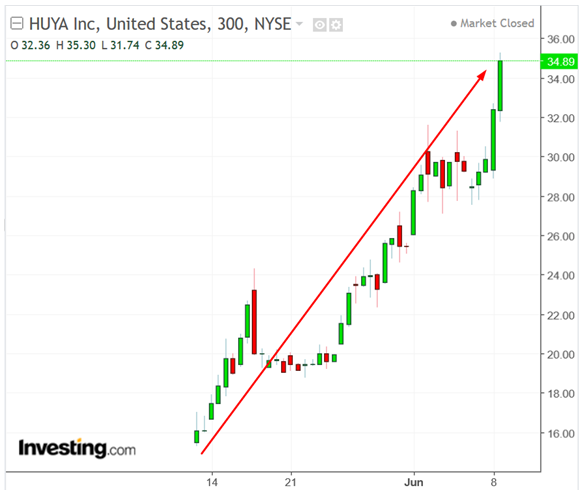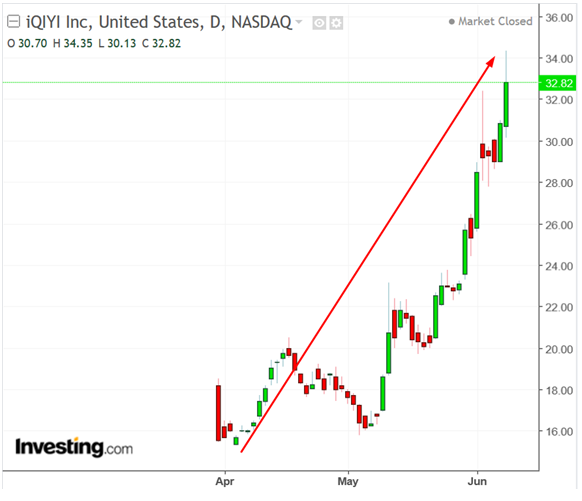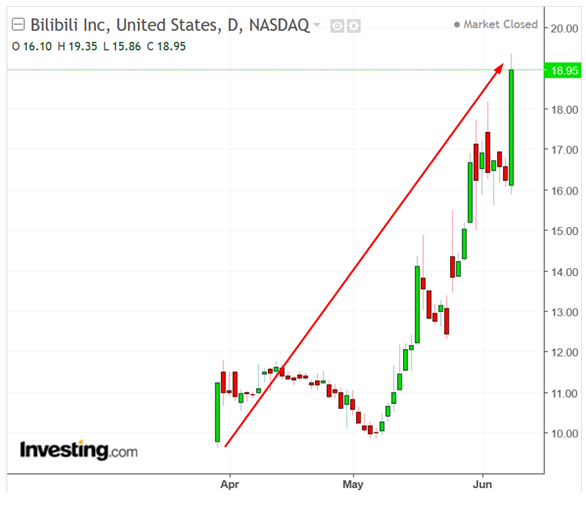In the past year there have been 24 U.S. listed initial public offerings (IPOs) from Chinese companies, the largest number of Chinese listings on Wall Street since 2010, when a record 39 Chinese companies went public. But in the eight years since, Chinese listings in the U.S. plummeted following a series of accounting scandals, suspensions and de-listings that kept investors wary, and Chinese companies at bay.
That appears to be changing now. In part it's due to improved accounting and transparency, as well as more attractive valuations in the U.S. But there’s another key difference, says Dan McClory of Boustead Securities, which underwrote three of the Chinese IPOs this year.
“So now the resurgence is related to Chinese companies coming to market in the U.S. with Chinese investors. So these companies aren’t just coming to the U.S. and thinking they’re going to have capital thrown at them. They’re coming with their checkbook already full from investors from China who are closer to the company, who know and understand it better, and who are in a lot of cases better long-term fits.”
Drew Bernstein concurs. He is co-managing partner at Marcum Bernstein & Pinchuk, which audited five of the Chinese listings this year.
“A lot of the more recent IPOs, they’ve [also] had this little nuance to them in the sense that they’ve had some of these really stellar companies or brand-name companies participating as shareholders. So you’ve had Tencent (OTC:TCEHY), Alibaba (NYSE:BABA), Baidu (NASDAQ:BIDU) all participating as shareholders in some of these recent IPOs, which I think adds some credibility to them from the investors side.”
Indeed, two Chinese tech companies, YY Inc (NASDAQ:YY) and Baidu, both recently spun off their streaming video units as IPOs. YY spun off its gameplay video streaming unit HUYA Inc (NYSE:HUYA) in mid-May, while Baidu spun off iQIYI (NASDAQ:IQ), the largest online video platform in China, in late March.
These two freshly publicly traded names are each up an average 100% from their offer prices, making them two of the best performing China IPOs in recent years. Another recent IPO, Bilibili (NASDAQ:BILI)—the Chinese online entertainment and gaming website—has also scored its investors some impressive returns, 90% so far.
Do these three names have more room to run? Or has the train left the station on these stellar performers, making it too late for latecomers to benefit?
1. Huya
Huya is China's largest live-streaming platform for video games and e-sports. As mentioned above, it's a spin-off from the Chinese video-streaming company YY, which still owns a 45% controlling interest in the company. Another investor in this new company is Chinese messaging and gaming giant Tencent Holdings, which owns nearly 35% of Huya. In addition to Tencent's $462 million stake, venture capitalist investors in Huya include Morningside Group, China Ping An Insurance, and Engage Capital, which together invested $75 million in March 2017 to complete the YY spin-off.
The Guangzhou, China-based tech firm is often considered the “Twitch of China”—the live-streaming platform purchased by Amazon (NASDAQ:AMZN) for $970 million back in 2014.
Huya, which debuted on the New York Stock Exchange on May 11, raised $180 million when it IPOd 15 million American depositary shares (ADS) at $12.00, the high end of its estimated range. It ended its first session up 33.8% per share to $16.06. Since the company's first day of trade, the stock has climbed nearly 90% to around $35 per share.

Huya reported first-quarter earnings on June 5. Results showed that revenue more than doubled to $134.5 million, up 111.5% compared with the year-earlier period. Live streaming revenues were up 102% to $124.0 million, while advertising and other revenues grew 212% to $7.95 million. The company is projecting similar annual revenue growth for the current quarter, which should bode well for the stock going forward.
Average monthly active users (MAUs) hit 92.9 million, up 19.2% from the same period a year earlier, while average mobile MAUs rose 25% to 41.5 million. Total paying users were 3.4 million, up 34.9%.
Based on these figures Huya is by far the largest live-streaming gaming community in China. The Asian nation has the world's largest games market in terms of revenue and gamers at 646 million. That number is expected to reach 917 million by 2022, according to the IPO prospectus.
Is investing in Huya, one of the leaders in gaming video and e-sports content in the biggest video game market in the world, still a smart move? Based on the growth possibilities for the company it sure seems like it: the global audience for Gaming Video Content is estimated at 665 million, including 224 million (34%) in Asia alone.That's a potential customer base that's larger than subscribers to HBO (NYSE:TWX), Netflix (NASDAQ:NFLX), ESPN (NYSE:DIS), and Hulu combined.
Currently the market leader, Huya is in a great position to benefit from the rise of mobile internet penetration, gaming video content and e-sports growth in the biggest video game market in the world. Judging by how the stock has been acting, it wouldn't be far-fetched to see it hit the $50-level in the coming weeks.
2. iQiyi
iQiyi is China's largest video-streaming service. Like Huya, iQiyi is also a spin-off though it's still partly owned by its original parent Baidu, which China's version of Google (NASDAQ:GOOGL). Baidu holds a 70% stake in the streaming platform.
The entertainment company creates its own content, thereby dubbed "China's Netflix". According to a recent report, iQiyi's original content accounted for five of the top 10 internet variety shows and six of the top 10 internet drama series in China last year, based on each title’s peak monthly active users (MAU).
iQiyi went public on March 29, at a price of $18.20 per ADS for a total offering size of $2.25 billion. The stock sank nearly 15% on its first trading day, ending at $15.55. But IPOs can often be volatile during early trade. iQiyi subsequently recovered and is now nearly 110% higher at $32.80.

iQiyi reported its first results as a public company on April 26, and the company's performance was better than many had anticipated. The streaming platform generated revenue of about $778 million, an increase of 57% year-over-year.
iQiyi finished 2017 with 424.1 million MAUs on personal computers and 421.3 million on mobile. Daily active user hours grew 16% to 300.1 million, thanks to its mobile users spending an average of 1.7 hours on the platform.
Most significantly, its paid subscribers surged 68% from the prior-year quarter, to 50.8 million. iQiyi looks set to benefit even further from this development in the future. According to a recent survey, the ratio of paying internet video users in China has increased from approximately 1.2% in 2012 to 13.2% in 2016. It's expected to increase yet further, to 40.0% in 2022.
Along with favorable revenue prospects from membership fees, iQiyi also has strong internet video advertising growth to count on. That's an added 'bonus' on top of the high expectations for its revenue.
Indeed, the service's ad revenues grew 52% to $366.5 million last year, fueled by the more efficient monetization of its brand advertising business, an expanding library of free content, and the growth of its in-feed advertising business. Its content distribution revenues rose 44% to $42.5 million, supported by the licensing of several drama series to external partners.
Despite the nonstop comparisons to Netflix, Dr. Tim Gong Yu, iQiyi’s founder and chief executive officer, said recently he was modelling the company after Disney rather than the U.S. streaming giant.
In an interview with the South China Morning Post last month, Yu said he'd prefer to see his company as the next Walt Disney Company with a worldwide entertainment empire spanning many sectors and industries. Yu hopes to achieve this audacious goal within the next 20 to 30 years using lessons learned from Disney's 70-year trek to the same goal to speed up iQiyi's progress.
As of this writing, iQiyi shares have more than doubled since spinning off less than three months ago from Baidu. It's easy to see why investors are excited about the company's bold vision and ambitious goals. While the stock is most likely to pull back in the near-term and consolidate recent gains, it would not be a surprise to see this hit $50+ in upcoming months.
3. Bilibili
On March 28, Bilibili, China's most popular website for streaming animation videos and mobile games, held its initial public offering. It raised $483 million by offering 42 million shares which priced at $11.50. After an initial surge to the $11.80 level, the stock experienced some choppy trading, taking it to a post-IPO low of $9.86 on May 7. Since then, however, shares of Bilibili are up an astounding 90%, having rallied above the $19-level just last week.

It’s fair to say that Bilibili’s first financial report as a publicly traded company was a resounding success. On May 24, the online video site said that revenue doubled in the first quarter while losses narrowed. Revenue for the quarter was $138.4 million, up 105% from a year earlier, while its adjusted net loss was $501,000, compared with a loss of $9.3 million in the year-ago period. The results also showed double-digit growth in its mobile business.
The platform’s popularity continues to increase. Bilibili attracted a monthly average of 77.5 million active users through the first three months of the year, 35% higher than the prior year’s first quarter, with mobile representing 82% of the total. Of perhaps greater significance, average monthly paying users reached 2.5 million, a whopping 190% increase from the same period last year. On the mobile gaming front, Bilibili’s paying users have grown 79% to 0.8 million.
Rui Chen, Bilibili's chairman and chief executive said in a press release:
"We have seen a substantial increase in the number of paying users, demonstrating our strong momentum driven by the implementation of our monetization strategies."
"As the hub for China's distinct and thriving Generation Z culture, we believe we are uniquely positioned to capture the future of online entertainment market in China."
Bilibili’s top and bottom line are both growing faster than anyone had predicted before the company went public as it encourages more of its young users to pay up. This alone makes the stock well positioned for the future and a good bet going forward.
